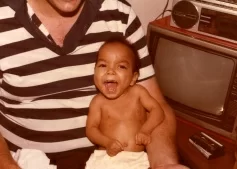 without a thought on my part. But Luke came to my mind yesterday and I looked up some information on him and discovered that his birthday had just passed. I found this old article that I wrote about Luke a few years ago. I thought I'd share it again. I am convinced that there are important and significant lessons we can learn from his life, and that I need to regularly share what I think they are. I hope you enjoy this!
without a thought on my part. But Luke came to my mind yesterday and I looked up some information on him and discovered that his birthday had just passed. I found this old article that I wrote about Luke a few years ago. I thought I'd share it again. I am convinced that there are important and significant lessons we can learn from his life, and that I need to regularly share what I think they are. I hope you enjoy this!The mysteries of God are a part of the Christian life that can often lead to confusion, doubt and even discouragement for believers.
- For some, it's a pride thing. We want to have answers – we want to understand, to be able to grasp the complexities of Biblical truth and God's plan for mankind.
- For some, God's mysteries – the unexplained things of life – are stumbling blocks to faith:
1. Why do bad things happen to good people?
2. Why does He allow pain, suffering and evil to thrive in our world?
Several months ago we were witnesses to the aftermath of the tragedy in Pennsylvania involving the Amish community, where, good, decent, hard working, non violent people were subjected to unspeakable cruelty towards their children. How can this happen?
3. One of our CSC children, who grew up in the worst poverty imaginable in Cebu City, was adopted into a family in the United States several years ago. Well meaning people would tell her how lucky she was and how God obviously had a wonderful plan for her life. She had a hard time with that and would sometimes ask her parents, "But what about all the kids who are still there, who weren't adopted, and who are still suffering and dying? What is God's wonderful plan for their lives? Why me and not them?
For many of us, we celebrate the goodness of God in our lives, we praise him for his healing, for material comforts, for blessing our efforts – even as we observe people who remain sick or disabled, who suffer in poverty – those who efforts and initiatives end in disappointment and ruin.
There are two extremes in terms of people's reactions to the things about God and life that are not understood.
1. There are those who try in vain to grasp the ungraspable – to be able to reduce the mysteries to understandable formulas or explanations. I remember a young seminarian who came to Cebu and who filled the pulpit of our church on a Sunday evening. He preached for an hour on the "peace of God that passes all understanding." Perhaps he felt that if he preached long enough he could crack that nut and open our understanding!
We all know those who have reduced the book of Revelation to precise charts and timetables, giving us easy to understand categories for all of human history and, most especially, the times to come.
2. A second category are those who shake their heads and say, "We'll only know these answers when we get to heaven." They suspend inquiry, not bothering to seek answers to the perplexing questions of life.
Living and working in a Third World country like the Philippines brings some of these mysteries to the front of our lives. Poverty, and all that goes with it, is "in your face." People often ask me "How do you like living in the Philippines?" That's a tough one to answer. Life anywhere has its highs and lows. Some days are great, others are difficult. I often answer this way:
1. When I'm sitting down to a nice breakfast I am aware that, within a few meters of my house are families that have no breakfast.
2. When I'm driving to the office or the Shelter I often pass people walking along the road who, for lack of a few cents can not even afford public transportation and must walk.
3. When I stop to buy medicine for my family or the CSC kids, there are people standing nearby whose children are dying for lack of that very same medicine.
Why am I blessed and they are not?
I recall a conversation with a missionary a few days after Cebu was hit by a strong typhoon. Many of our CSC workers lost their roofs or their entire homes. The houses of the poor were devastated by the high winds and torrential rains. The missionary said that it had been such a miracle how God spared the missionary homes from damage, holding his hands of protection around us during the storm. I remember wondering whether it wasn't more a matter of our having cement houses and strong metal roofs.
Why did our CSC kids have to suffer so much? And how much more, those who live on the street and cannot be admitted to CSC?
These are tough questions. When it comes to trying to understand our own suffering, the Bible gives some answers. For example, Romans 5:3-4 tells us that suffering produces perseverance, perseverance character, and character, hope. And the Bible gives us additional hope that we will someday come to see God's purpose and mysteries:
"But now we see through a glass dimly, but then face to face."
And we hear the testimonies of Christian brothers and sisters who have lived through terrible times and have turned negatives into positives in their lives.
Several months ago I was attending a conference in Bismark, North Dakota. One of the featured speakers was Steve Saint, Steve's father, Nate Saint, was one of the five missionaries killed in 1956 by Aucan warriors in Equador. Steve told about what that tragic day meant to his family, and what it was like when his dad, his hero, didn't come home that day. We saw video of his current family life, and saw a man who was interacting with Steve's children, and who was being referred to as "Uncle." It turns out that this was the very man who had killed Steve's father, who had come to know Jesus and had experienced the forgiveness of God and of the Saint family and now was a part of their family – an amazing story of how good things had come out of tragedy and suffering.
So the clear message is that God has a plan for our lives, we will discover that plan in the right time. He is writing our life's stories, but some of the chapters are difficult ones.
We can understand this. We can, when aided by the Holy Spirit, see how difficulties and suffering are part of a purification process for us, and that we, like Job, will eventually be better people for it.
But what about people who, because of major disabilities, are unable to understand their situation, unable to discern the hand of God or his plan for their lives. Where is the purification and growth and ultimate value for these people? What could God's purpose possibly be?
Back on 1982 a baby was born in a charity ward in a small hospital in Cebu City. 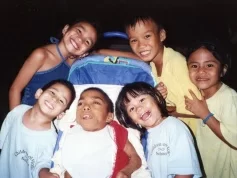 The baby underwent cardiac arrest during birth and was without oxygen for an extended time. Unlike many cases of charity patients, the hospital staff decided to resuscitate the baby, even after he had suffered massive brain damage and cerebral palsy. The baby's mother abandoned him in the hospital, and after a couple months Luke was referred to CSC. When we took him in he appeared to be a bouncing baby boy. We did not know that he would not develop physically beyond about a year and a half, or mentally beyond a few months. Luke would never speak, nor have voluntary movement of his arms or legs.
The baby underwent cardiac arrest during birth and was without oxygen for an extended time. Unlike many cases of charity patients, the hospital staff decided to resuscitate the baby, even after he had suffered massive brain damage and cerebral palsy. The baby's mother abandoned him in the hospital, and after a couple months Luke was referred to CSC. When we took him in he appeared to be a bouncing baby boy. We did not know that he would not develop physically beyond about a year and a half, or mentally beyond a few months. Luke would never speak, nor have voluntary movement of his arms or legs.
Luke became a fixture at CSC. For over 23 years he was an integral part of our lives and a symbol of CSC and what we are all about.
Many times Luke would be hospitalized – often due to upper respiratory infections. He fought for his life many times. There were at least a dozen times when we were sure that he would die. The doctors had told us that he wouldn't make it past five years old. Then they revised it to nine, then 11 – certainly he wouldn't reach his teenage years.
One time, when Luke was critically ill our staff met to pray and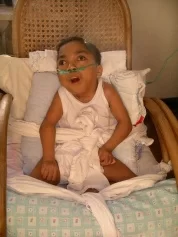 I asked them to reflect on his life. Here is why: I believe that God had a purpose for Luke's life when he created him. I believe that He uses people like Luke to teach us important things. But here is the rub: If we don't spend time reflecting on these lessons, then Luke's life is useless. Its up to us to allow God to make sense of Luke's life.
I asked them to reflect on his life. Here is why: I believe that God had a purpose for Luke's life when he created him. I believe that He uses people like Luke to teach us important things. But here is the rub: If we don't spend time reflecting on these lessons, then Luke's life is useless. Its up to us to allow God to make sense of Luke's life.
And what are the lessons that we found? What has God taught us through his life?
1. First, life is precious. Even though he had nothing to live for, from the world's point of view, Luke clung to live almost ferociously. Some of us who have much more to live for take life casually, we take life for granted. Not Luke. Every day was a struggle. Every breath had to be fought for. Life is a gift from God and we should treat it carefully.
2. God has provided us with opportunities, through Luke's life, to minister to him in significant and life-saving ways. He has provided an avenue for us to live out the biblical mandate to minister unto the "least of these," because, truly, Luke was in that category. Hundreds of people have been given a blessing to participate in the support of CSC that reaches out to children like Luke and many others with other special needs.
3. In so doing, He has given us a chance to show others a Godly value system that doesn't reserve love and attention for those who have something to give back, or who have "potential" or a bright future. For many people who live in a developing country, where resources are limited, this has been a difficult lesson to learn. How could we justify spending so much money for Luke's hospitalization when other, "normal" kids needed care? Luke's life gave us the opportunity to teach about the value of life and about how God looks at all of us.
4. Luke has been a tremendous ambassador for CSC. People around the world remember observing the loving care that he received by our staff and workers. They remember his famous smiles. They may quickly forget the names of the staff or other children, but they remember Luke. "How's Luke doing?" we get asked wherever we go to talk about the ministry of CSC. And our care of Luke helps us explain the true nature and core values of our work in the Philippines.
5. Luke has been a safety valve for those that had an opportunity to know him. My job as Field Director of CSC involves lots of administrative chores, like making budgets, government relations and various kinds of problem solving. There are days when I get stressed out and start to feel the weight of the world on my shoulders. But all I needed to do is to drive a few short miles to where Luke lived, to hold him in my arms, and I get a clear picture of what real struggles are all about. My struggles paled in comparison to what Luke faced every day. Self pity may be easy for some people, but those that knew Luke have no excuse for feeling sorry for themselves. What a great gift that was to all of us.
A little over a week before we left Cebu, Marlys called me on my cell phone and told me that I should get to the hospital quickly, as Luke wasn't doing well. He had been hospitalized for over a week and his breathing was bad. I had gotten messages similar to this one throughout Luke's life, so I went to the office and took care of a few things. But the Lord laid it on my heart to go see Luke and when I entered his room his breathing was extremely labored. He looked different than I had ever seen him, and it became clear that he was dying. I sat down next to him, kissed him and looked into his eyes. For 23 years we had loved this boy. It wasn't easy to say goodbye. I said to him, "Luke. You can go. Go to be with Jesus, Luke. I love you." Within a couple of minutes Luke took his last breath. 23 years of pain, suffering, limitations, hospitalizations, forced breathing, skin rashes and infections were over. We would never see Luke's smile again.
As Luke was dying in that hospital room, I made a promise. I'm not sure if I was making a promise to Luke, to God or to myself. But I decided then and there that I was going to talk about Luke on our coming furlough. I believed then and do now, that the church of Jesus Christ needs to hear about Luke, that the lessons of his life are important ones. Many Americans are complainers - full of self pity. People who have so many material comforts are unsatisfied. American discourse is increasingly a chorus of victim and entitlement claims. Charles Sykes, in his book "A Nation of Victims: The Decay of the American Character" states that, "in a nation where everyone is a victim, no one is a victim." In our preoccupation with our own needs we have a hard time seeing the needs of others – people like Luke.
In his song "God Help the Outcasts," the Hunchback of Notre Dame poses several difficult issues:
I don't know if there's a reason
Why some are blessed, some not
Why the few You seem to favor
They fear us, flee us,
Try not to see us.
The first part we have already examined. The second is our call to arms. "Why the few You seem to favor, they fear us, flee us, try not to see us."
I don't know what factors might make it difficult for us to see the needs of society's outcasts. Perhaps we are too busy. Maybe our personal and church calendars are so full that there just isn't room for Luke, or the man who had fallen to thieves at the side of the road, to break into our day. Maybe we are numbed or fatigued by the needs of others, or simply overwhelmed by the circumstances of our own lives. Maybe we have become cynical. "Why did that guy travel this road at this time carrying that amount of money? He deserves what he got!"
Maybe, just maybe, Luke can help cut through the apathy, the self-centeredness and cynicism of our lives. He was a person with significant needs that he didn't cause. He was totally dependent on others to live. His life had none of the possibilities and opportunities that we take for granted every day. He needed us so very much. Maybe Luke can serve as a symbol of many others that we come into contact with. Maybe Luke can help us rescue our lives.
Farewell Pacadas
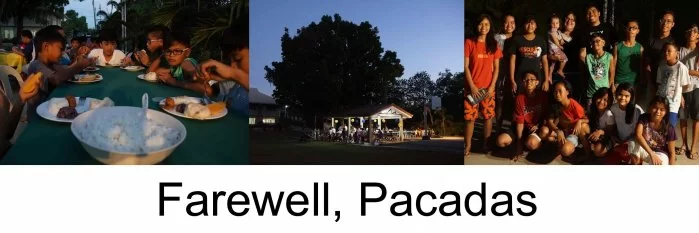 Recently we bid farewell to Amy, Marcel and Emily Pacada, who left for the U.S. The party included great food, a slide show and words of love and appreciation and love from staff, co-workers at the school and some of the kids. And, of course, they were serenaded with our traditional farewell song, "God Will Take Care of You." Amy was a teacher in our Children of Hope School since it began 18 years ago. Marcel joined the CSC team a few years ago in the HR department. They will be missed. We wish them well as they locate in North Dakota and start a new chapter in their lives. Thanks, Pacadas, for what you have contributed to CSC. God bless you.
Recently we bid farewell to Amy, Marcel and Emily Pacada, who left for the U.S. The party included great food, a slide show and words of love and appreciation and love from staff, co-workers at the school and some of the kids. And, of course, they were serenaded with our traditional farewell song, "God Will Take Care of You." Amy was a teacher in our Children of Hope School since it began 18 years ago. Marcel joined the CSC team a few years ago in the HR department. They will be missed. We wish them well as they locate in North Dakota and start a new chapter in their lives. Thanks, Pacadas, for what you have contributed to CSC. God bless you.
That Can't Be Right!
Those were the words I said when the accounting team added up the donations at our recent banquet. We had a lower attendance this year: 650 instead of our usual 750-800 people. Statistically, the offering should have been substantially lower than usual.
The day of the banquet, the staff and volunteers gathered and prayed for the event. We prayed that God would work in the hearts of those who were attending and those who couldn’t attend, that the night would be honoring to God and that the donations received, whatever amount, would be what we needed to sustain this part of the ministry.
And then all of you showed up. You stepped up to sponsor the event, gave donations that night, and many of you gave gifts despite the fact that you could not attend the banquet. So at 8:30 pm, when the accounting team gave the total of $142,820.90, we weren’t sure what to believe. Could it be possible that even with fewer people in the room, we broke a record for our banquet offering? Yes, it was possible.
Just over a week later, when the online donations have been processed, all the checks have been double and triple checked, and a few other gifts arrived in the mail from those who wanted to contribute to the banquet offering, our total is now sitting at $144,686.43. It is amazing and is only possible because God used all of you to make this happen. We certainly aren’t in the clear for the rest of this year. The banquet total is about 14% of our budget for the year. But we know we will be all right because with God all things are possible.
Surgeons!
They can do pretty much anything! It's amazing! OK, they're not your regular surgeons. They are CSC's construction surgeons and they can create or reconfigure almost anything to make it better or different.
So we (Principal Cris and I) had this idea to rearrange the principal's office during the summer break to open up the space and make it useable for a resource room when kids needed behavioral or academic help away from their peers. The trouble is that the office is tiny and has built-in cabinets across the middle of it, dividing the space into two little rooms. We asked Jerry, the head surgeon (aka CSC Facilities Director), if he could reconfigure the office to make it one space, taking out the cabinets and mounting them on a different wall so they could still be used. Another idea was to have sliding doors made to still have the option of closing off the office when more privacy is needed.
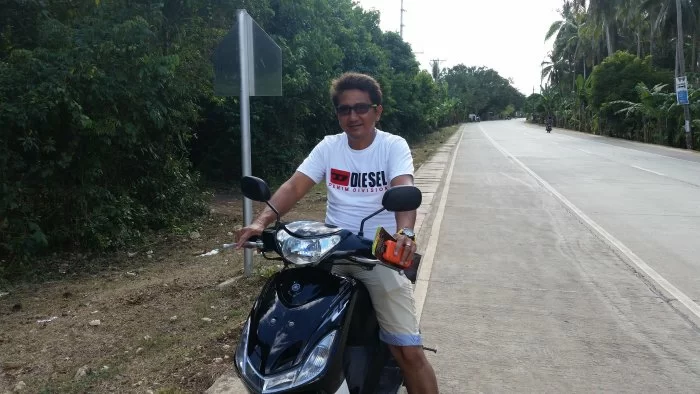 School ended last week, so Jerry and his team of surgeons got going right away. Cio (CSC construction and maintenance) is the main surgeon when it comes to these kinds of projects, so he started to carefully extract the shelves without wreaking them. Verhilio (CSC maintenance and plumbling) was support surgeon and Bobong (school maintenance) helped with moving the shelves once they were cut out.
School ended last week, so Jerry and his team of surgeons got going right away. Cio (CSC construction and maintenance) is the main surgeon when it comes to these kinds of projects, so he started to carefully extract the shelves without wreaking them. Verhilio (CSC maintenance and plumbling) was support surgeon and Bobong (school maintenance) helped with moving the shelves once they were cut out.
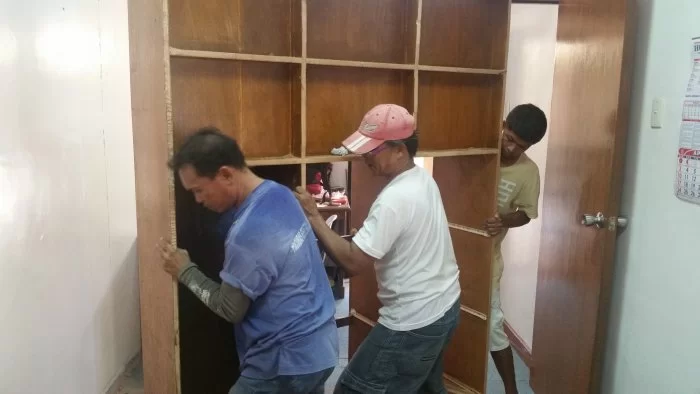 And so before our very eyes, we can now envision a new function for the principal's office. These guys are great. They tackle projects without hesitation and think anything is possible. I guess it is!
And so before our very eyes, we can now envision a new function for the principal's office. These guys are great. They tackle projects without hesitation and think anything is possible. I guess it is!
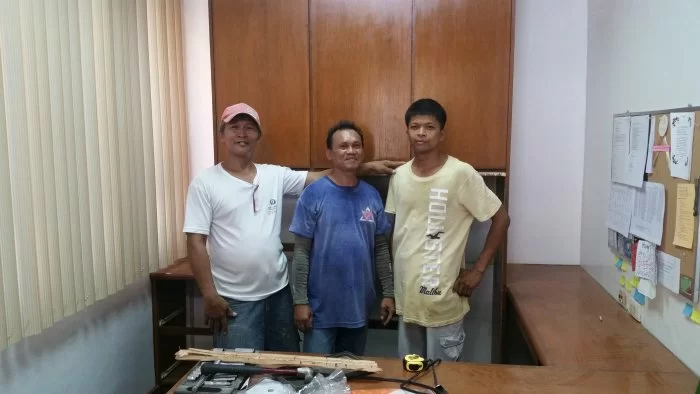
Kites
Kite season is underway at CSC. The kids are excitedly looking for plastic bags, sticks, and string. They are creative in their design and can't wait to get their kite flying in the air. The aunties are even excited to help the younger children make kites. You have to be careful walking around CSC these days as you might trip on string or be ran into by someone trying to get their kite in the air. Unfortunately the trees at CSC seem to collect a lot of kites these days. That doesn't matter though or stop the fun from happening at CSC. I would encourage you to go out and fly a kite. It's a lot of fun no matter what age you are.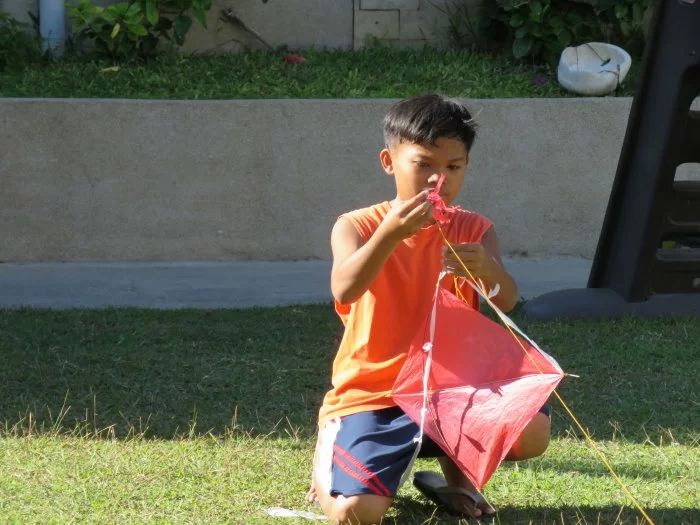
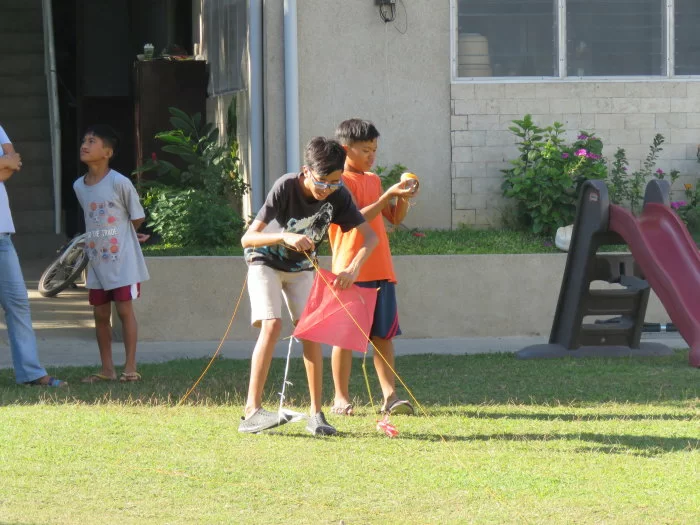
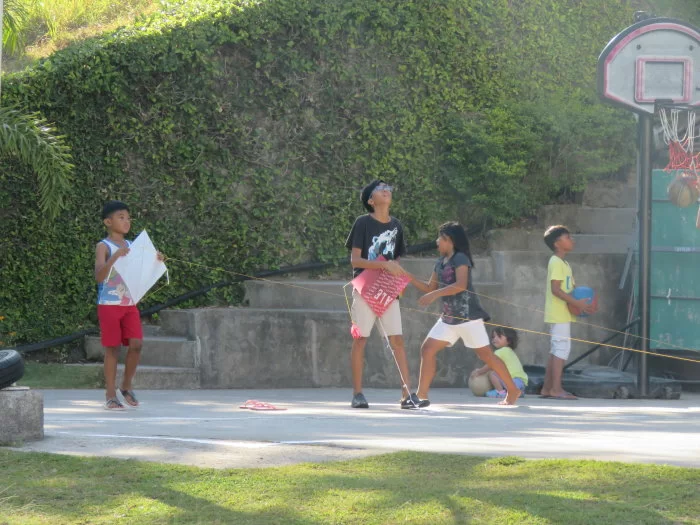
Blessed Decisions
I sat in a referral meeting the other day. We have these meetings to discuss children for potential admittance. Often in these meetings the list of children in need is greater than what our homes can house. The list is long because poverty is destructive; it untangles families when there are more mouths to feed than there is food to give. The list is long because of poverty, violence, abuse, neglect, drugs, sickness, and death. All of our children come to CSC for one or several of these reasons.
Our top priority was to discuss a 6-week-old baby boy very much in need of loving care and proper nourishment, some things he had not had much of yet. He was so tiny, not even four pounds yet. He had spent these first weeks of his life in the Neonatal Intensive Care Unit fighting off sepsis and trying his best to grow but not receiving enough nourishment to do so. His young mother had her own struggles, battling mental health issues and cognitive delays; she was also doing her best to be a good mom but was unable to do what was needed.
Here he is. He is such a small little guy, barely able to keep his eyes open most of the time.
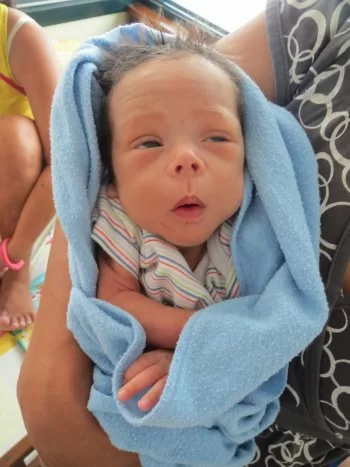 Our decision to admit this child or not might seem
like a no-brainer. He needs good care;
he needs the kind of care that can be provided at CSC. But he is so young, only six weeks old. Doctors have met him, observed him, and run
tests to try to figure out what is keeping him from growing and
developing. Because of his age, there is
little they can know for sure. The
unknowns regarding his future are many.
Our decision to admit this child or not might seem
like a no-brainer. He needs good care;
he needs the kind of care that can be provided at CSC. But he is so young, only six weeks old. Doctors have met him, observed him, and run
tests to try to figure out what is keeping him from growing and
developing. Because of his age, there is
little they can know for sure. The
unknowns regarding his future are many.
Of course, the same could be said about every child admitted to CSC and that would be true. But with a child who has had such a rough start to life, permanent damage could have already been done. The type of permanent damage that could prevent him from being adopted. And that is what it inevitably comes down to. CSC is a temporary place for children to come to for stability, healing and growth before continuing all of that in their forever family. We need to admit children that will be adopted so there is space for others to come after.
Big decisions. And they are not made lightly. We seek and pray for God’s wisdom regarding which children we admit. We take all of the information given to us by the social workers, our medical team, physical therapists and doctors in the community and cover it in prayer. Individually and collectively. These decisions are made easier when we spend time in the referral meetings talking about how so many times before, staff members have had these same conversations, sharing valid concerns about taking in a certain child with unknown needs. And we have been blessed to see God's hand at work, healing children in miraculous ways.
One such story stands out to me. A little 7-month-old girl was referred to us, weak and malnourished and her limbs were so floppy. They lacked muscle tone for such a while that doctors suspected she might never walk. Fast forward 2.5 years and we have a rambunctious and mischevious little girl on our hands. And oh how she RUNS! And next week a family is arriving to take her home! She is a testament to God sitting with us in those meetings and honoring CSC's commitment to venture into the unknown. She is a living and breathing example that God heaps blessings on those who walk in faith!
I am so happy to report that the little guy above recently had a major test, the results of which we were expecting to be poor, but which were normal. We are already seeing God's hand at work in his life. We felt confident and happy to make him the newest member of the Eicher Home! :)


























